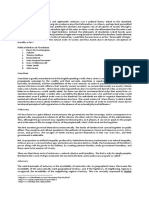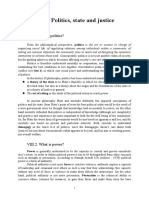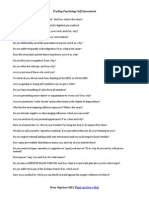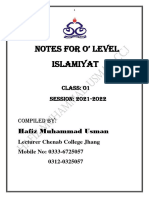The Doctrine of Anarcho-Royalism
The Doctrine of Anarcho-Royalism
Uploaded by
Emile YusupoffCopyright:
Available Formats
The Doctrine of Anarcho-Royalism
The Doctrine of Anarcho-Royalism
Uploaded by
Emile YusupoffCopyright
Available Formats
Share this document
Did you find this document useful?
Is this content inappropriate?
Copyright:
Available Formats
The Doctrine of Anarcho-Royalism
The Doctrine of Anarcho-Royalism
Uploaded by
Emile YusupoffCopyright:
Available Formats
The Doctrine of Anarcho-Royalism My political opinions lean more and more to Anarchyor to unconstitutional Monarchy-J.R.R.
Tolkien To celebrate our magnificent monarchs sixtieth anniversary of rule, I have decided to pen an article with an appropriate theme and advocate a position on the theoretical and practical validity of a monarchy. There are several common answers to this question. Monarchists argue that our current institution is theoretically justified due to tradition, nationalism and given its constitutional (and essentially symbolic) function, and justifies itself through a strong civic role, bringing in revenue and acting as a useful piece of national and constitutional furniture. Republicans, by contrast, argue that the monarchy should be done away with, based on theoretical problems (inherited privilege is wrong and it is slightly disturbing that UK denizens are subjects rather than citizens) or the practical issue of someone receiving more unearned benefits than all other claimants combined. There are also probably some ultra conservatives who would enjoy a return to the divine right of kings. My view is rather different. I believe that an absolute monarchy would be a good idea, amidst an entirely different form of political organization. Though this may sound obscenely reactionary, it is quite the reverse when the full implications of my proposition for the new structure of society are considered. These are encapsulated by the marriage of absolute monarchy, with a complete abolition of enforced non-voluntary control. This is the doctrine of anarcho-royalism. The politically astute amongst the readership may find that this idea is oxymoronic (or simply moronic). Surely ideals of absolute freedom and voluntarism are the exact opposite of a single person holding untrammelled power over others? Surely monarchy and anarchy are at completely opposing ends of the political spectrum? Well, yes, but only in the ways in which they have been practised and preached as of yet. Our current notions of these power relations are limited by past experience, the barriers of language and our stultified Western-bourgeois-liberal conceptual schemes. A look at human nature, when properly understood by a political theorist who can look past those all encompassing blocks on everyone elses perceptions, reveals how anarchoroyalism could not only work, but would be justified and is, indeed, how society must necessarily be organised. A key debate running through politics concerns whether man benefits or suffers from having external authority exerted over them. Such a division can be said to perhaps define (an aspect of a certain definition of) the left/right divide. Roughly speaking, those with a liberal heritage generally follow Rousseau in the view that Man is born free, but is everywhere in chains. From this perspective, people should be left free unless there is a strong justification for things being otherwise. Authority is at best a necessary evil, and at worst utterly unjustified. The alternative perspective is that having deference towards someone (or indeed something) else is actually healthy as well as necessary. This view underpins traditional conservatism, paternalism, authoritarianism and, of
course, monarchy. It is also an oft unspoken key plank supporting communitarianism, socialism and theocracy (where abstracts such as society or god replace people or institutions as that which it is beneficial to have as a master). These positions put forward alternative conceptions of human nature, but, importantly, both pick up on something true and neither holds the monopoly on correct opinion. The truth is that both desires/drives run through all people. We all crave both freedom and security. We simultaneously want to follow our agendas and ideals, whilst also seeking to absolve ourselves of responsibility for mistakes and failings. Hence, we both seek to be autonomous, and to surrender to the rule of something above ourselves, whether an actual ruler or an abstraction. The most successful ideologies and programs have been based on an accommodation between these contrasting forces. Capitalism is a good example of this. On the one hand, individuals are free to pursue their own economic aims, and negative liberty is maximised. On the other hand, at the very least, people are at the mercy of the market, and some are in positions of wage slavery or face conditions of asymmetric bargaining. Communism involves a similar internal contradiction. So-called communist regimes feature liberation through egalitarianism, whilst also having supreme dictators and generally centralised authority. More generally, socialism of all stripes can be seen to liberate people from economic hardship, whilst simultaneously making them slaves to the abstraction of society. Contrastingly, those systems that attempt to deny the validity of one side of the coin and hold up the other as an absolute (fascism or classical anarchism for example) have utterly failed to propagate in the long run. However, even those systems that have some form of compromise are based on an attempt to avoid or garble the central issue. Liberalism, for instance, argues that having institutions, a rule of law and indirect democracy actually increase freedom, rather than admitting that this is a limitation of individual autonomy. The truth is that both desires (to be free and to be ruled) must be recognised, and treated as absolutes-and not as things that are to be compromised (either in terms of one taking precedence over the other, or in terms of some kind of contradictory attempt to reconcile them through limitations and checks/balances). A system that successfully implemented this would provide an end of history, as it would amount to a pure expression of human nature in its totality, surpassing the internal contradictions, oppression or lies of all previous politics. Anarcho-royalism is this system. In essence, this would consist of the sort of society usually championed by anarchists, with the proviso that there would be a monarch that has no checks on their power and authority. There would be no centralised organisation, control or planning. All decisions regarding economic and social relations would occur at a local grass-roots level, with people and communities following their own immediate desires without being stopped by the edicts of a government or limited by the reality of an economic system. There would be total freedom with people facing no limitations of laws or oppression. There would be no state, no government, no organisations, no corporations, no bureaucracy, no police, no property, no taxation, no borders, no money, no wage-
labour, no coercion, no hierarchy and no institutions. This would be anarchy in the sense that there would be no rule and no law. There would probably also be absolute chaos. But its only bourgeois indoctrination that makes you think that thats bad. Amidst all of this, however, would be the absolute monarch. The monarch would have totally unlimited power, with there being no need for a further justification for their orders, beyond the fact that their will demands it. They would be a total dictator with an extreme cult of personality. This would be focused both on the institution and its traditions, as well as on the individual in place (although not due to any merit or actions on their part-they would be worshiped as a token rather than as an agent). No matter how bad people deem them to be, they retain all of their status, powers and perks. Despite surface appearances, there is no contradiction within this. This is because, in the perfect conditions of anarcho-royalism, people would choose to worship their absolute ruler, due to the other side of human nature, the desire to be totally free, being fully expressed. Everyone is able to follow any desire that they have to its full conclusion with no limitations, allowing for collectively expressed freedom and pure individual autonomy. These are, after all, conditions of perfect liberty. This situation leaves the drive to be ruled totally free to express itself fully as well, i.e. under a master who has no limits. Both sides of our political instincts would therefore be fulfilled and allowed to flourish properly, rather than be forced to exist in a constricted state or denied in totality. Further, the nature of total freedom requires that there is some form of authority in existence to prevent that liberty from collapsing in on itself. Whilst a degree of conflict and destruction is healthy (note how repressed it is in our society), if it goes unchecked then freedom is ultimately compromised. Thus, there is a need for the existence of some kind of authority that acts as the source of motivation to not destroy limitlessly. An absolute monarch is the only type of ruler that can provide this. Dictators, who hide behind false ideologies, and elected officials, who pretend to act according to the will of the people, are inherently limited in their ability to pursue their primary function, as they must at least pay lip service to their other duties. Additionally, a monarch can hold power in a manner that lacks legitimacy in an unparalleled manner, enhancing their aura of absolute power. Contrastingly, having a monarch alone as the source of authority actually allows for more freedom in a general sense than does a system, institution or group of rulers. This set of arrangements is ensured by the fact that whilst the monarch has total power personally, this is only personal authority. Their power can neither be extended to their subordinates or agents, nor to any institution or system built in their name. The duty to obey them applies only to them. This has two key benefits, which have been alluded to above. On the one hand, the monarchs authority is greatly enhanced as duties of obedience are tied only to them, and there is no trapping, institution, excuse or intermediary in between them and their subjects. On the other hand, freedom is maximised by this. As duties are owed only to the monarch, and nobody and nothing else in society holds any
official power, people are free in every aspect of their lives, asides from where they must bow to the monarch. Indeed, at the very least, this imparts a geographical, as well as an academic, limitation to the encroachment that authority can make on peoples liberties. It should also be noted that inheritance and life long rule do not fit neatly with this pure vision of human organization, as these are reactionary concepts. Instead a monarch rules for exactly seven years. They are initially chosen at the summer solstice at which stage an iron crown is welded to their head and everyone in society pledges to worship them. For seven years they reign as an absolute ruler amidst pure anarchy, in the manner described above. However, on the summer solstice of their seventh year, they are ritually burned alive and then ceremonially cannibalised by the community. A new monarch is then chosen (through a randomised selection process-inheritance, election and merit are very bourgeois concepts) and the cycle begins anew, starting with the welding of the crown to their head. Like the existence of the monarchy itself, this does not occur due to any form of direction but, rather, happens spontaneously and naturally, as people left to their own devices will automatically and necessarily choose such a course. Whilst anarcho-royalist political practise may seem overly distinct from those of all hitherto existing societies this is because such a mode of social organisation would be the first to adequately account for and respect human nature. As a result, a form of spontaneous order will emerge naturally from pure anarchy, due to the full expression of our thus far denied or compromised desires and due to the central rallying point of the monarch. The end results of this seem peculiar given the lack of a like comparison from history, but can be determined precisely by the political theorist who isnt limited by the barriers of language and relativism that everyone else is trapped by. If this essay hasnt convinced you that anarcho-royalism is both moral and pragmatic, then youre probably indoctrinated by societal, relativistic and bourgeois ideas. Anyone who is intellectually honest will inevitably see the truth in this argument. Besides this, due to the inevitable deterministic course of history that has for the first time been recognised and understood, an anarchoroyalist society will inevitably emerge, as all other social structures collapse from their internal contradictions, and a system that allows the full expression of human nature will be seen as undeniably necessary. But, far more importantly, wouldnt burning and cannibalising an autocratic, despotic and omnipotent queen, before welding an iron crown to the head of her successor, be much more fun than meek displays of national fervour in the name of celebrating a mild mannered woman with no real power? Emile Yusupoff
You might also like
- Theodicy of Love - Cosmic Conflict and The Problem of Evil (John C. Peckham)Document297 pagesTheodicy of Love - Cosmic Conflict and The Problem of Evil (John C. Peckham)friends 10 seasons100% (4)
- Power, Authority and Legitimacy PPTDocument50 pagesPower, Authority and Legitimacy PPTPrecious Rabac75% (4)
- The Illumination of The Texts of TantraDocument86 pagesThe Illumination of The Texts of TantraGen Kelsang Donsang100% (1)
- The Ten MudrasDocument2 pagesThe Ten MudrasRaghavan Mayiladuthurai100% (2)
- Obw A Christmas CarolDocument10 pagesObw A Christmas Carolcarmen yaguachi100% (1)
- The Essential Adi ShankaraDocument242 pagesThe Essential Adi Shankarahavanur100% (9)
- AnarchismDocument7 pagesAnarchismNitz Malou PuhayonNo ratings yet
- AQA Unit 3 Political Philosophy - June 2012Document2 pagesAQA Unit 3 Political Philosophy - June 2012HJBNo ratings yet
- 01_Levy-2Document18 pages01_Levy-2n706874No ratings yet
- Politics HandoutsDocument5 pagesPolitics HandoutsHpesoj SemlapNo ratings yet
- Forms of GovernmentDocument64 pagesForms of GovernmentjenNo ratings yet
- About Liberal Democratic in ShortDocument5 pagesAbout Liberal Democratic in ShortAngel RajNo ratings yet
- ANARCHISMDocument16 pagesANARCHISMshivanah hunteNo ratings yet
- Name: Marwa Riaz Roll No: 25 Assignment: Political Science Semester: 2nd Department: Political Science & IR Government College Women University FaislabadDocument11 pagesName: Marwa Riaz Roll No: 25 Assignment: Political Science Semester: 2nd Department: Political Science & IR Government College Women University FaislabadZain RiazNo ratings yet
- Group 7Document15 pagesGroup 7soleilramirez217No ratings yet
- Forms of GovernmentDocument19 pagesForms of Governmentcharmieligutan92No ratings yet
- Democracy Is The Best Form of GovernmentDocument2 pagesDemocracy Is The Best Form of GovernmentAmit SinghNo ratings yet
- Theory of TotalitarianismDocument4 pagesTheory of Totalitarianismaru naNo ratings yet
- psc250 - Comparing Political IdeologiesDocument11 pagespsc250 - Comparing Political Ideologiessam cadleyNo ratings yet
- Political SystèmesDocument13 pagesPolitical SystèmesMohamed Chellabi CzrNo ratings yet
- psc250 - Comparing Political IdeologiesDocument11 pagespsc250 - Comparing Political IdeologiesDannahNo ratings yet
- FMI Assignment: Different Types of GovernmentsDocument6 pagesFMI Assignment: Different Types of GovernmentsUmair Ali ShahNo ratings yet
- LAWPBComLLB254332rConrPr Constitutionalism ResearchArticle PDFDocument10 pagesLAWPBComLLB254332rConrPr Constitutionalism ResearchArticle PDFSancho RoyNo ratings yet
- What Is A GovernmentDocument12 pagesWhat Is A GovernmentLyka Mendoza MojaresNo ratings yet
- 1AC Postanarchism NDT 15Document12 pages1AC Postanarchism NDT 15Nathan RothenbaumNo ratings yet
- Political Ideology Political PrinciplesDocument9 pagesPolitical Ideology Political PrinciplesthepathfinderformercuryNo ratings yet
- Wagan POLSCI301 Assign 0913Document8 pagesWagan POLSCI301 Assign 0913Anthony WaganNo ratings yet
- There Are Many Difference Between Power and AuthorityDocument6 pagesThere Are Many Difference Between Power and AuthoritySammie FizleNo ratings yet
- Chapter 2Document26 pagesChapter 2Ryan MosendeNo ratings yet
- Constitutional Underpinnings: The Influence of The European EnlightenmentDocument11 pagesConstitutional Underpinnings: The Influence of The European Enlightenmentapi-164891616No ratings yet
- Political Organization, Authority and LegitimacyDocument4 pagesPolitical Organization, Authority and LegitimacyVince Troy Aquino100% (1)
- State and CoercionDocument9 pagesState and CoercionAmartya BagNo ratings yet
- LECTURE 2 Sir CanayDocument8 pagesLECTURE 2 Sir CanayKeneth NagumNo ratings yet
- Sovereignty: Prof. Dr. Khalid Manzoor ButtDocument13 pagesSovereignty: Prof. Dr. Khalid Manzoor Buttmusafir0% (1)
- The Voluntary SocietyDocument5 pagesThe Voluntary SocietyJim AndersenNo ratings yet
- Sets Administers Public Policy Exercises Executive Sovereign Power Customs Institutions LawsDocument3 pagesSets Administers Public Policy Exercises Executive Sovereign Power Customs Institutions LawsJon CrisantoNo ratings yet
- 2 Authority and ObligationDocument8 pages2 Authority and ObligationKristy LeungNo ratings yet
- Political Science Assignmement V-I-A-68 (Sovereignty)Document11 pagesPolitical Science Assignmement V-I-A-68 (Sovereignty)RITIKA KEDIANo ratings yet
- Constitutionalism: September 2010Document10 pagesConstitutionalism: September 2010Dilip KumarNo ratings yet
- Forms of modern GovernmentsDocument14 pagesForms of modern GovernmentsNoah NaigutaNo ratings yet
- Environment Design 136 StudyDocument3 pagesEnvironment Design 136 Studyxruiyas095No ratings yet
- VIII - Politics, State and JusticeDocument15 pagesVIII - Politics, State and JusticeJavier Hernández IglesiasNo ratings yet
- Theory ofDocument2 pagesTheory ofBittu HidkoNo ratings yet
- Man and The StateDocument3 pagesMan and The StateAnonymous K286lBXothNo ratings yet
- 2 Political Systems and RegimesDocument2 pages2 Political Systems and RegimesPplcallme sadjedNo ratings yet
- Lessons 9-13 UcspDocument5 pagesLessons 9-13 UcspNicole anne loredoNo ratings yet
- 8a. Theories of SoverreigntyDocument27 pages8a. Theories of SoverreigntyRohit Mohan0% (1)
- Government and Politics PDFDocument8 pagesGovernment and Politics PDFAsm ParvezNo ratings yet
- Dreyfus, Hubert L., and Paul Rabinow. Michel Foucault: BeyondDocument10 pagesDreyfus, Hubert L., and Paul Rabinow. Michel Foucault: BeyondDavid MoonNo ratings yet
- Government and PoliticsDocument10 pagesGovernment and Politicsizen villarealNo ratings yet
- Chapter Seven Contemporary Forms of GovernmentsDocument12 pagesChapter Seven Contemporary Forms of GovernmentslmNo ratings yet
- MALATESTA - Anarchy (1891)Document33 pagesMALATESTA - Anarchy (1891)Tiago TrigoNo ratings yet
- SovereigntyDocument23 pagesSovereigntyYukti GuptaNo ratings yet
- State N FunctionsDocument59 pagesState N Functionsjyoti panditNo ratings yet
- Some Key TermsDocument3 pagesSome Key Termsmani tagejaNo ratings yet
- Britanica ConstitutionalismDocument7 pagesBritanica ConstitutionalismShivam MishraNo ratings yet
- Dr. Ram Manohar Lohiya National Law University: SovereigntyDocument8 pagesDr. Ram Manohar Lohiya National Law University: SovereigntyShivaniChauhanNo ratings yet
- Democracy and Natural LawDocument40 pagesDemocracy and Natural Lawromantic_love_07_326No ratings yet
- Lust For Power (Jacques Ellul)Document4 pagesLust For Power (Jacques Ellul)MakingSense100% (2)
- Stasis Before the State: Nine Theses on Agonistic DemocracyFrom EverandStasis Before the State: Nine Theses on Agonistic DemocracyNo ratings yet
- 1.) ODLICNO Heywood Chapter 3-Political Ideologies IDocument101 pages1.) ODLICNO Heywood Chapter 3-Political Ideologies Izvrkmrk100% (2)
- Different Interpretations of Public Sphere - Vittorio AllegriDocument7 pagesDifferent Interpretations of Public Sphere - Vittorio AllegriRev. Johana VangchhiaNo ratings yet
- Dead Sea Scrolls - TranslationDocument6 pagesDead Sea Scrolls - Translationanon-788708100% (8)
- RPT Hifz Al Quran T4 2022Document10 pagesRPT Hifz Al Quran T4 2022Sumaiyah WahabNo ratings yet
- Societies in The Roman Catholic ChurchDocument6 pagesSocieties in The Roman Catholic ChurchsurhelixNo ratings yet
- B. Voluntariness of Human ActsDocument13 pagesB. Voluntariness of Human ActsjacaubanNo ratings yet
- Trading Psychology Self AssessmentDocument4 pagesTrading Psychology Self Assessmentbarral2100% (1)
- Tema 53Document13 pagesTema 53anonimo anonimoNo ratings yet
- Harold Bloom - Major Short Stories Writers - Katherine Anne PorterDocument89 pagesHarold Bloom - Major Short Stories Writers - Katherine Anne Porterandremdm200850% (2)
- Sample of Islamic Choral SpeakingDocument1 pageSample of Islamic Choral SpeakingNur Asheila IINo ratings yet
- Tatramajjhattatā PDFDocument3 pagesTatramajjhattatā PDFmisanthropoNo ratings yet
- Uoloaded To Scribd Book ReviewDocument4 pagesUoloaded To Scribd Book ReviewbtivendaleNo ratings yet
- Officials List - 2024 - FinalDocument4 pagesOfficials List - 2024 - FinaljohannesjuniordanielNo ratings yet
- Hazrat Abu Sufyan Aur Un Ki Ahliya by Maulana Muhammad NafayDocument145 pagesHazrat Abu Sufyan Aur Un Ki Ahliya by Maulana Muhammad NafayShahood Ahmed100% (1)
- The 8 Schools of Tibetan BuddhismDocument17 pagesThe 8 Schools of Tibetan BuddhismMartin SeidenstickerNo ratings yet
- Major Differences Between Domestic HRM and IHRMDocument32 pagesMajor Differences Between Domestic HRM and IHRMReena ShyamNo ratings yet
- Subject: English Lesson Name: - Class: Vii Day/ DateDocument2 pagesSubject: English Lesson Name: - Class: Vii Day/ DateAafiyahNo ratings yet
- StigmataDocument12 pagesStigmataapi-19961817No ratings yet
- Human Relationship: N. Gokulmuthu Sonim TechnologiesDocument17 pagesHuman Relationship: N. Gokulmuthu Sonim TechnologiesSunil SharmaNo ratings yet
- Class O1 Islamiat NotesDocument41 pagesClass O1 Islamiat NotesTayyeba MaryamNo ratings yet
- Expectations For Worship Team Members: SchedulesDocument2 pagesExpectations For Worship Team Members: SchedulesEstelle FisherNo ratings yet
- 1 PBDocument12 pages1 PBUmi ArifahNo ratings yet
- Return To SenderDocument10 pagesReturn To SenderApostle Andre WiltshireNo ratings yet
- Heart Advice For Death and Dying Session 3 OutlineDocument2 pagesHeart Advice For Death and Dying Session 3 OutlinetoronyoraNo ratings yet
- The Ten Commandments of GodDocument4 pagesThe Ten Commandments of GodApril Mariz Mendador RagaNo ratings yet
- Topic: Hiba: Hiba:-Hiba (Tamlik Al Ain) Is "An Act of Bounty by Which A Right ofDocument10 pagesTopic: Hiba: Hiba:-Hiba (Tamlik Al Ain) Is "An Act of Bounty by Which A Right ofsparsh lalNo ratings yet
- DR Ezekiel WallaceDocument2 pagesDR Ezekiel WallaceJustin FandangoNo ratings yet

























































































